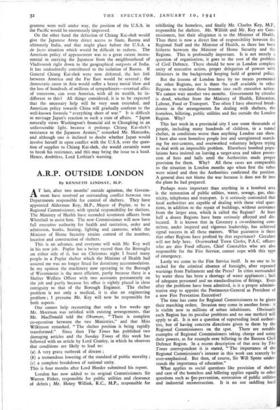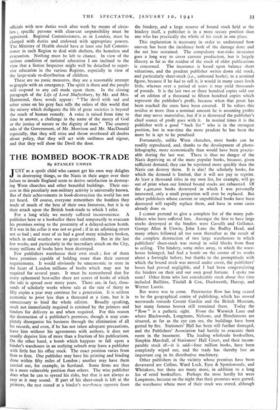A.R.P. OUTSIDE LONDON
By KENNETH LINDSAY, M.P.
AT last, after two months' outside agitation, the Govern- ment have resolved an outstanding conflict between two Departments responsible for control of shelters. They have appointed Alderman Key, M.P., Mayor of Poplar, to be a Regional Commissioner, with special responsibility for shelters. The Ministry of Health have seconded seventeen officers from Whitehall to assist him. The new Commissioner will now have full executive authority for health and sanitation, order and admission, bunks, heating, lighting and canteens, while the Minister of Home Security retains control of the number, location and construction of shelters.
This is an advance, and everyone will wish Mr. Key well in his new job. Poplar has a better record than the Boroughs on either side of it, but on Christmas night I found many people in a Poplar shelter which the Minister of Health had assured me was no longer fitted for dormitory accommodation. In my opinion the machinery now operating in the Borough of Westminster is the most efficient, partly because there is a Shelter Welfare Officer with two assistants permanently on the job and partly because his office is rightly placed in close contiguity to that of the Borough Engineer. The shelter problem is not only a medical, it is also an engineering problem ; I presume Mr. Key will now be responsible for both aspects.
One cannot help recounting that only a few weeks ago Mr. Morrison was satisfied with existing arrangements, that Mr. MacDonald told the Observer, " There is complete co-operation between the two Ministries," and that Miss Wilkinson remarked, " The shelter position is being rapidly transformed." Since then The Times has published two damaging articles and the Sunday Times of this week has followed with an article by Lord Cranley, in which he observes that conditions are likely to lead to: (a) A very grave outbreak of disease ; (b) a tremendous lowering of the standard of public morality ; (c) a complete breakdown of national unity.
This is four months after Lord Horder submitted his report. London has now added to its original Commissioners Sir Warren Fisher, responsible for public utilities and clearance of debris ; Mr. Henry Willink, K.C., M.P., responsible for rebilleting the homeless, and finally Mr. Charles Key, M.P., responsible for shelters. Mr. Willink and Mr. Key are Com- missioners, but their allegiance is to the Minister of Health. Thus there is now a direct line of responsibility between the Regional Staff and the Minister of Health, as there has been hitherto between the Minister of Home Security and the Regions. This is profoundly important. It is not merely a question of organisation, it goes to the root of the problem of Civil Defence. There should be now in London complete unity of executive action, proper delegation of powers with Ministers in the background keeping hold of general policy.
But the lessons of London have by no means permeated the other Regions, nor is there the staff available in other Regions to translate those lessons into swift executive action. We cannot wait another two months. Government by circular is dead, whether from the Ministry of Health, Education, Labour, Food or Transport. Too often I have observed break- downs in the arrangements for dealing with shelters, the homeless, billeting, public utilities and fire outside the London Region. Why?
This last week in a provincial city I saw some thousands of people, including many hundreds of children, in a tunnel shelter, in conditions worse than anything London can show. I have also seen homeless people lost and unregistered search- ing for rest-centres, and overworked voluntary helpers trying to deal with an impossible problem. Elsewhere bombed popu- lations have insisted on leaving a target-area and taken posses- sion of huts and halls until the Authorities made proper provision for them. Why? All these cases are comparable to the situation in London months ago when first the tubes were seized and then the Authorities confirmed the position. A general does not blame the war because it does not fit into the plans he had prepared.
Perhaps more important than anything in a bombed area is the restoration of public utilties, water, sewage, gas, elec- tricity, telephones and transport. Is it seriously contended that local authorities are capable of dealing with these vital ques- tions, in addition to the repair of buildings, without assistance from the larger area, which is called the Region? At least half a dozen Regions have been seriously affected and dis- located. It is known that in Coventry a co-ordinating com- mittee, under inspired and vigorous leadership, has achieved signal success in all these matters. What guarantee is there that other Regions have profited by that experience? Circulars will not help here. Overworked Town Clerks, P.A.C. officers who are also Food officers, Chief Constables who are also responsible for the Fire Service, cannot cope with this type of emergency.
Lastly we come to the Fire Service itself. Is no one to be sacked for the criminal absence of foresight, after repeated warnings from Parliament and the Press? In cities surrounded by water there has been a shortage of water appliances ; lack of adequate personnel and no standardisation of fittings. Even after the problems have been admitted, is it a proper adminis- trative step to appoint the Postmaster-General as President of a new Fire Prevention Executive?
The time has come for Regional Commissioners to be given their marching orders. Invasion may come in another form: it is visible now to millions of urban inhabitants. Obviously each Region has its peculiar problems and no one method will apply to all. It is not a question of superseding local authori- ties, but of having concrete directions given to them by the Regional Commissioners on the spot. There are notable examples of Regional Commissioners taking charge and using their powers, as for example over billeting in the Eastern Civil Defence Region. In a recent description of that area by The Times correspondent it is stated, " The importance of the Regional Commissioner's interest in this work can scarcely be over-emphasised. But then, of course, Sir Will Spens under- stands the importance of education."
What applies to social questions like provision of shelter and care of the homeless and billeting applies equally to other questions such as fire-prevention, restoration of public utilities and industrial reconstruction. It is no use saddling local officials with new duties week after week by means of circu- lars ; specific persons with clear-cut responsibility must be appointed. Regional Commissioners, as in London, must be charged with duties and endowed with appropriate powers. The Ministry of Health should have at least one full Commis- sioner in each Region to deal with shelters, the homeless and evacuation. Nothing must be left to chance. In view of the serious condition of national education I am inclined to the view that a Senior Inspector might well be detached to super- vise education in the various Regions, especially in view of the large-scale re-distribution of children.
These are no panic measures, they are a reasonable attempt to grapple with an emergency. The spirit is there and the people will respond to any call made upon them. In the closing paragraph of the Life of Lord Shaftesbury, by Mr. and Mrs. Hammond, these words appear: " The devil with sad and sober sense on his grey face tells the rulers of this world that the misery which disfigures the life of great societies is beyond the reach of human remedy. A voice is raised from time to time in answer, a challenge in the name of the mercy of God or the justice of nature or the dignity of man." The country asks of the Government, of Mr. Morrison and Mr. MacDonald especially, that they will seize and throw overboard all doubts about policy, that they will act with swiftness and vigour, and that they will show the Devil the door.



























 Previous page
Previous page